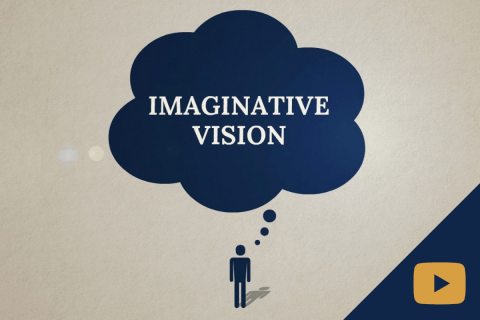
An imaginative vision forms the basis of action for societies and individuals alike, and the human imagination allows us to carry an entire world within our minds.
Every human society possesses with more or less strength a moral and spiritual imaginative vision, a set of assumptions and a way of looking at things that is largely taken for granted rather than argued for. These fundamental assumptions provide the atmosphere the society’s members breathe and the soil in which the various institutions of the society take root and grow. Such a vision is holistic, a way of seeing things. It is usually secured by a religion that orders the deepest questions, but it includes more than what we usually call religion: not only a moral code, but also an accepted ideal of the good person, clear categories of success and failure, economic and political values and practices, legal codes and public policy, manners and modes of entertainment. Such a vision is the property not just of a few specially educated people but of the whole society. Some will understand and be able to articulate it better than others, but all will possess it. In a vigorous civilization this imaginative vision is more or less a settled matter, and the longer it is settled, the more deeply and unconsciously it is assumed. When a culture’s vision is seriously contested, the society will go into a crisis until its original vision is either reconstituted or overthrown and another overarching vision takes its place.
To call such a vision “imaginative” is not to say that it is “make-believe.” It refers rather to the remarkable human capacity to maintain in our minds much that is not immediately in our surroundings. Animals are dominated by time and sense; their world is circumscribed by what is available to their senses at any given moment. But humans are capable of transcending the immediate circumstances of time and place and of carrying a whole world in their minds, reaching back into the past and going forward into the future, embracing other places and realizing even invisible realities. This is why each individual has been called a “microcosm” of the universe, because each of us carries a whole cosmos within us, and we gauge how we are to act depending on the features of that cosmos. Much of what it means to be converted in mind is to receive and embrace the Christian imaginative vision of the cosmos: to see the whole of the world according to the revelation given in Christ, and to act upon that sight with consistency.
It is typical that the majority of the members of a given society assume its imaginative vision without much difficulty, often unconsciously. A minority will be very zealous for the maintenance of the truths and practices embedded in the ruling vision, while a greater number will pay little conscious attention to them and will drift along with the prevailing current. But few will deny them outright.
To take a limited example: in the United States, democracy both as a governmental form and an ideal of life is part of our received vision. Most Americans can hardly imagine a different polity or way of looking at things: try suggesting that we would do best as a monarchy and see how far the suggestion goes or whether it can even be taken seriously. A relatively small number really understand what democracy means, what its possibilities and dangers are, or how to establish it and how to preserve it, but almost all assume it and order their lives under its influence. One might say something similar about our view of the importance of education, or of the priority of physical health, or of the ethical imperative to be concerned about the environment. Many don’t pursue these ideals with much energy, yet they assume them. They don’t posit a different vision even when they neglect them.
Much of what it means to be converted in mind is to receive and embrace the Christian imaginative vision of the cosmos: to see the whole of the world according to the revelation given in Christ, and to act upon that sight with consistency.
The ruling vision of a given society will have many sources: religion, philosophical currents, traditions that come down from long usage, social and political experience as it is distilled over time, as well as linguistic and geographic and artistic influences. What is important to note is that such a holistic vision, whether possessed by a society, or a group of people within a broader society, or an individual, is the basis of that society’s, or group’s, or person’s action. The vision need not be – and often is not – fully consistent in its philosophical or religious principles; it may be that it cannot be easily distilled into a set of propositions or laid out as a coherent program for ordering a life or a society. What matters is that it gathers together an overall view such that the individual and the society are given a basis to move, to make decisions, to pursue one path rather than another. Its power is in its ability to hold together a world in a more or less compelling narrative. Those who are taking such action usually do not know why they find their way so obviously; they are under the influence of a set of first principles, often hidden away in their minds and acted from rather than discussed.
Another way of describing this is to note that each society, each group within a society, and each individual carries an inner narrative that provides a sense of meaning and direction. Because humans are creatures who make our way through space and time, who are by nature historical beings with a past and a future, we are necessarily involved in a kind of story, and we cannot escape the construction of a narrative that provides a compass and signposts along the way. There are no doubt better and worse narratives, and they are susceptible to examination and development over time; but none of us can function without a narrative of some sort, even if we might want to or claim to. For most, this personal narrative will be assumed, often unconsciously, from the broader society’s ruling imaginative vision. As life goes on, depending on cast of mind and opportunities, some will bring various aspects of this inherited vision under scrutiny and either lay hold of it more firmly and with greater understanding or perhaps adjust it and amend it, even at times entirely rejecting it in order to embrace a different vision and a different narrative. But for the majority the ruling vision is never examined, because it is not known to exist. It is not so much something that is seen as something through which everything else is seen. It appears, if at all, as simply self-evident.
To point out the existence of such a largely unconscious ruling vision or narrative is not to complain about it: it has to be this way. Only the very few have the time and resources and talent to painstakingly sort out the foundations of a society’s life or even the life of an individual. Yet everyone needs to act. This is one of the beneficial functions of traditions and cultural practices of all kinds, whether religious or national or familial. They bring forward for new members a tested vision of the whole of life and thereby give ready criteria for what is success and what is failure, for what needs to be considered in making decisions; in short, for action.
Pollsters often ask: Are things in general going in a good direction or a bad one? Is life in America, or on earth, getting better, getting worse, or staying about the same? The response to such a question always assumes a particular overall vision and a corresponding narrative, without which no possible answer could be given. The one who sees the main story of life as a battle for economic success and has sorted out plans that hinge upon ever-increasing possibilities of possessions and financial security will answer this question on the basis of economic variables: wealth is increasing and the possibilities for further increase look favorable into the future, so things are going well; stocks are down, markets are fragile, and inflation is high, so things are going badly. The one who sees the world as an arena in which the struggle for personal freedom is played out will evaluate the question on the basis of factors like the success or failure of democracy in America and around the world or the degree to which individual freedom is being ever better protected or ever more encroached upon. The one who sees the fundamental drama of life as an evolutionary process demanding the proper handling of the ecosystem in order to secure the further development of the human race will look to questions of pollution or climate change or sustainable use of resources. The one whose narrative involves a revelation of cosmic battle for souls between God and the devil will answer the question according to the advance or retreat of Christianity.
The same holds true at the individual level. Every time a person is asked the common question, “How are things? How is life going?” the answer is based upon some assumed narrative embedded in an overall vision of life, one that spells out what personal success and failure mean and how they are to be assessed.
[An imaginative vision] is not so much something that is seen as something through which everything else is seen. It appears, if at all, as simply self-evident.
An assumed narrative vision can be seen to be in play, whether in an individual or in a society as a whole, when a given proposition or way of acting is immediately either affirmed or ruled out of court without serious argument, even if it has not been self-evident to other individuals or to other human societies. To take a few current examples: slavery is a self-evident evil in America; we don’t argue about it. If the suggestion were made that slavery was on the whole a good, or at least a neutral and necessary thing, it would not be met with careful argument; we would run it out the door, despite the fact that many human societies, including some now existing, have found justifications for it. On the other hand, we are now having to argue over ideas and practices whose worth (or lack of worth) would have seemed self-evident for many societies and in no need of argumentation, such as abortion or homosexual marriage. This is not to say that such questions are morally arbitrary, or that careful thought about them is unimportant, or that no arguments could or should be made for one view over another. It is rather to note that for the majority, arguments are not the main basis of action. When a given way of thinking or acting is part of an overall imaginative vision, it will be assumed as self-evident. Arguments, such as they are, will be marshaled to support the previously held vision, and challenges to it will tend either to be ignored or ridiculed and shouted down.
It has long been one of the primary aims of the western educational tradition to free the mind (hence the “liberal” arts, the arts that liberate) not from a ruling narrative, which is undesirable and impossible, but from unexamined assumptions that may make a ruling narrative irrational or incoherent. The collapse of such education in our time only means that we are frequently dealing with individuals and groups of people, often highly “educated,” who are conspicuously unaware of their ruling visions and the assumptions they bring to questions of the day, and who are therefore little able to apply to those assumptions the kind of examination that could increase their clarity and purify them from irrationality. This clarifying role is one of the tasks of reason as regards faith. Faith gives us, from God himself, the overall narrative for the human race: who we are, who God is, what his purposes toward us are, how we have gotten into our current state, what God is doing about it, what is coming in the future, and therefore, how we should live. Reason keeps that narrative from wandering into superstition or bigotry or incoherency, such that it can provide a good and true basis for handling life.
This five-part series is drawn from From Christendom to Apostolic Mission: Pastoral Strategies for an Apostolic Age, published by the University of Mary (2020).

